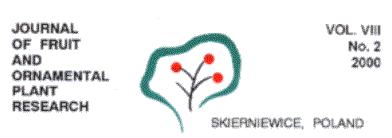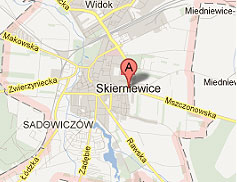VOL. VIII No. 2 2000

Carlos R. Wlosek-Stangret1, Krzysztof J. Rakowski2, Ewa Jadczuk1
1 Warsaw Agricultural University, POLAND
2 Forest Research Institute, Warsaw, POLAND
EFFECT OF A ROOTSTOCK ON APPLE SHOOT GROWTH AND IAA, ABA AND CALCIUM CONCENTRATION IN LEAVES
ABSTRACT. Concentration of indolyl-3-acetic acid (IAA), abscisic acid (ABA) and calcium have been determined in shoot leaves of 'Joangold' apple trees grafted on P 14, P 22, P 60, M.9-751 and M.26 rootstocks. The leaves of semi-vigorous trees growing on M.26 and P 14 had lower levels of free ABA and calcium than those from dwarf trees on P 22, M.9-751 and P 60. Free and conjugated IAA concentrations were similar in the foliage of all trees tested with the exception of those on P 60, where the content of conjugated hormone was higher as compared to other combinations. Apple trees grafted on semi-vigorous M.26 and P 14 terminated growth later than those on dwarfing rootstocks. These results are discussed in terms of a possible involvement of hormones and calcium in the rootstock effect on tree vigour
Key words: apple, IAA, ABA, calcium, rootstock, growth vigour
Andrzej Pidek, Piotr Brzozowski
Research Institute of Pomology and Floriculture
Skierniewice, POLAND
REAL AND POTENTIAL POSSIBILITIES OF ORCHARD POLLINATION BY BEES
ABSTRACT. The commercial use of bees for pollination of entomophilous crops in Poland was investigated in a survey of 694 apiaries during 1991-1999. It has been found that on average 10.6% of apiaries rent bees for commercial pollination, but only half of that (6.1%) for orchards. During the period of a survey a tendency was observed to decrease bee renting rate, especially for orchard pollination. Bigger apiaries consisting of more than 50 bee colonies, rented their bees for pollination more frequently than those smaller.
The income from renting bees is not attractive for a beekeeper. Since the potential honey production from an orchard can cover only the sustentation of bee colonies required for its pollination, the government should subsidize the bee renting. This especially applies to those regions where a population of honeybee is low in relation to the acreage of entomophilous crops.
Key words: honey bee, commercial pollination, orchard
Anna Mareczek, Maria Leja, Jan Ben
Agricultural University, Krakow, POLAND
TOTAL PHENOLICS, ANTHOCYANINS AND ANTIOXIDANT ACTIVITY IN THE PEEL OF THE STORED APPLES
ABSTRACT. Total phenolics and anthocyanins as well as total antioxidant activity (TAA) were determined in apple peel of two cultivars: Golden Reinders and Gala Must. The analyses were performed after 200 days of storage either in the regular storage at 0 oC or in controlled atmosphere (CA; 5% CO2, 3% O2) and after additional 8 days at 16 oC. The level of phenolics in stored fruits was similar, except 'Golden Reiders' apples kept in CA, showing significantly higher content of those compounds. Additional 8 days at 16 oC reduced phenolics content only in the peel of 'Gala Must' fruits previously stored in the regular storage. Anthocyanins were not detected in the peel of 'Golden Reinders' apples, while in 'Gala Must' they increased in fruits stored both in the regular storage and CA but distinctly decreased being kept for 8 days at 16 oC. Total antioxidant activity of fruit peel determined after 200 days both in the regular storage and in CA was very low but rapidly increased after additional 8 days at 16 oC.
Key words: apple, storage, phenolics, anthocyanins, antioxidant activity
Paweł Bielicki, Alojzy Czynczyk, Danuta Chlebowska
Research Institute of Pomology and Floriculture
Skierniewice, POLAND
EFFECT OF A ROOTSTOCK AND TREE LOCATION ON YIELD AND FRUIT QUALITY OF 'KING JONAGOLD' APPLES
ABSTRACT. The influence of new dwarf and semi-dwarf rootstocks and tree location in an orchard on growth, yield and fruit quality of 'King Jonagold' apple cultivar were investigated. The results obtained in the first three years of the experiment showed a good performance of trees on new Polish rootstocks. Growth of trees grafted on subclones of M.9 rootstock was comparable to those on M.9 EMLA. A slight decline of the land on which the orchard was located significantly differentiated tree growth and yield. In general, trees growing up the slope were bigger and produced higher fruit yield than those further down.
Key words: rootstock, growth, yield, fruit quality, frost injuries, tree location, Malus domestica Borkh.
Adam Szewczuk
Agricultural University, Wrocław, POLAND
EFFECT OF TREE SPACING ON GROWTH AND YIELD OF
TWO PEACH CULTIVARS DURING THE FIRST THREE YEARS AFTER PLANTING
ABSTRACT. Peach trees, cvs Early Redhaven and Inka on Manchurian peach rootstock were planted in the spring of 1996 at three spacings in the row: 4, 3 and 2 m. The interrows were 6 m wide in all combinations. The trees were pruned in different methods depending on a planting distance. Trees spaced at 3 and 4 m in the rows were formed in Open Vase system, while those planted at 2 m distance were trained in V system. Yield per area unit was related to plant spacing. During the first three years of fruiting yield per hectare from trees planted most densely and trained in V system was almost doubled as compared to those spaced at greater distances and trained as Open Vase
Key words: peach, planting distance, tree training
Dorota Kruczyńska, Alojzy Czynczyk, Barbara Omiecińska
Research Institute of Pomology and Floriculture
Skierniewice, POLAND
EVALUATION OF SCAB TOLERANT APPLE CLONES OF
POLISH ORIGIN
ABSTRACT. The objective of the study was to evaluate scab tolerant apple clones of Polish origin on M.26 rootstock in comparison to Freedom cv. The susceptibility to scab and powdery mildew as well as growth, cropping and fruit quality were observed. During 5 season of the study D3, D7 and V-151-D2 clones were resistant to apple scab in field conditions and not very susceptible to powdery mildew. 'Freedom' and D7 clone produced the biggest apples while those of D7 were the best coloured.
Key words: apple, scab-resistant clone, fruit quality
INSTYTUT OGRODNICTWA – PAŃSTWOWY INSTYTUT BADAWCZY
Siedziba Dyrekcji
ul. Konstytucji 3 Maja 1/3
96-100 Skierniewice
Tel.: 46 833 22 11 do 13 - Centrala
Fax: 46 833 31 86
e-mail: io@inhort.pl
ul. Pomologiczna 18
96-100 Skierniewice
Tel.: 46 833 20 21 - Centrala, 46 833 42 23 - Centrala
Fax: 46 833 32 28
ZAKŁAD PSZCZELNICTWA
W PUŁAWACH
ul. Kazimierska 2A
24-100 Puławy
Tel.: 81 886 42 08, 81 886 21 64
Fax: 81 886 42 09
e-mail:zaklad.pszczelnictwa@inhort.pl
© Copyright 2011 Instytut Ogrodnictwa, wszystkie prawa zastrzeżone / Kontakt: < Redaktor > < Webmaster >


